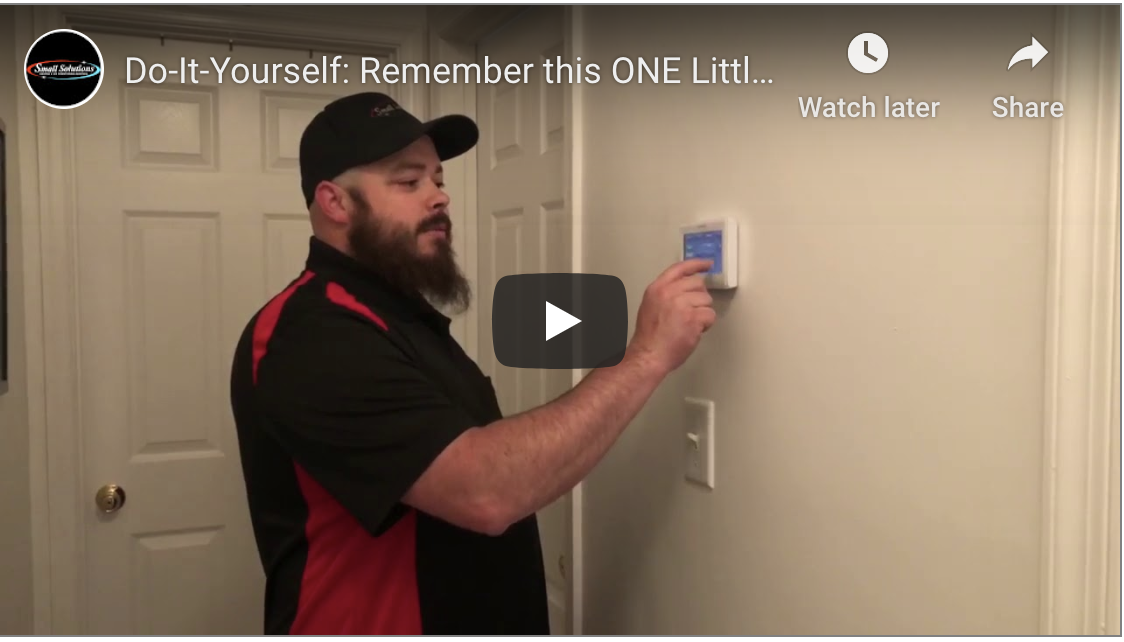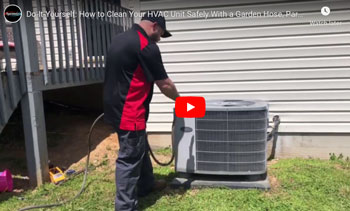Ductless HVAC?
The first time you heard that phrase, you might have felt confused. How can a ductless system heat and cool air without circulating it? And how could this less common HVAC model improve upon the ubiquitous forced air system?
Ductless HVAC operation is actually fairly simple, and it’s growing in popularity. That’s because it offers very real advantages over ductwork systems.
Even if you’ve never heard of ductless HVAC before, you owe it to yourself to learn about those advantages if you’re looking into a new HVAC system. Read on to learn more about this unique heating and cooling solution.
What Is Ductless HVAC?
The key ductless HVAC component you’ll interact with as a homeowner is the “mini-split” unit. Your ductless system can be as small as one unit in one room, or it can cover the entire house with multiple units.
Units tend to be a few feet long and protrude a few inches from the wall wherever they’re installed. If this size still causes a space issue, homeowners can recess them into existing walls and ceilings.
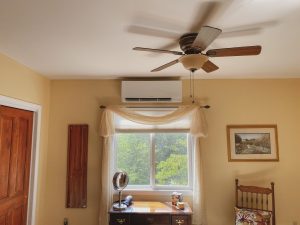 Each mini-split unit takes in air and uses a refrigerant to “suck out” heat before blowing the air back into the room. The refrigerant travels through a compact line connected to an outdoor condenser unit. The outside unit “dumps” the heat out of the refrigerant before recirculating it indoors.
Each mini-split unit takes in air and uses a refrigerant to “suck out” heat before blowing the air back into the room. The refrigerant travels through a compact line connected to an outdoor condenser unit. The outside unit “dumps” the heat out of the refrigerant before recirculating it indoors.
When you need to heat your home rather than cool it, the outdoor unit uses heat pump technology to simply move heat in the opposite direction.
A condensation channel and a powerline also travel along the narrow refrigerant conduit. You can connect as many or as few mini-split units to your ductless HVAC system as you want, as long as you size your outdoor unit appropriately.
Easy Installation
Looking into installing some ductwork? Get ready to live in a construction zone for quite a while. Ductwork installation and renovation require opening up walls and ceilings.
Ductless HVAC systems, however, usually only need a day of installation work per unit. Installing the refrigerant lines to connect different components often only needs one small hole in the wall.
Ductless HVAC systems ideal for making home expansions without adding bulky ductwork. They’re also great for updating older homes that were never built to hold ductwork in the first place.
Avoiding Ductwork Headaches and Scams
We’ve just listed some good reasons to install ductless HVAC in an expansion, renovation, or old house. But say you’re building a brand-new home where disrupting day-to-day living with active construction is less of an issue. Should you still take a close look at ductless HVAC?
Absolutely. One of the biggest reasons for looking at ductless is avoiding the headaches that come with ductwork maintenance.
Understanding the proper maintenance for ductwork can be challenging. Many environmental health experts agree that ducts affected by mold, vermin infestation, or excessive dust build-up require cleaning. Left unattended, these ductwork issues can worsen household air quality.
These problems are often hidden inside the ductwork. That makes detecting them difficult without paying for an inspection in the first place.
To further confuse matters, some environmental health experts advise against regular ductwork cleaning. In some scenarios, ductwork cleaning may significantly improve household air quality. And in worst-case scenarios, it can actually worsen it by disturbing and re-circulating settled dust.
If you’re looking for ductwork cleaning, you may find some surprisingly affordable offers. However, the duct cleaner world is rife with cheap, shoddy, and outright fraudulent cleaning practices.
An air duct scammer may only clean only what you can see, play a “bait and switch” on pricing, or claim they’ve found the nonexistent mold. That’s not to say quality cleaning services don’t exist, but you have to search hard for them.
Ductless HVAC: Easier Maintenance and Cleaner Air
Ductless HVAC systems use in-room, air-handling technology.
Rather than traveling yards of ductwork, the air in a ductless system only moves through the rooms of the house itself. The air doesn’t pass through hidden, contaminant-heavy areas. That makes maintaining acceptable air quality becomes much easier.
In fact, ductless systems can make air quality better.
Each air handling unit forces air through a filter that removes contaminants. That means ductless systems can essentially play double-duty as air purifiers and heating and cooling units. If indoor allergies have been a problem for you in the past, a ductless system could help.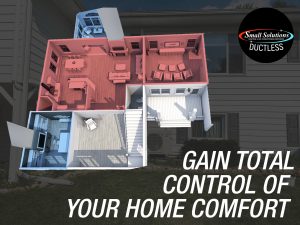
Just like all other heating and cooling tools, ductless HVAC systems do sometimes require maintenance. But, that maintenance is significantly more straightforward than it is with ductwork.
Air filters in each unit need regular cleaning to ensure optimal performance and avoid shortening the unit’s lifespan. Units may sometimes need servicing.
However, those units are easy for technicians to access (no hiring a cut-rate duct cleaner required). Refrigerant lines between units are sealed systems. That means they require far less maintenance than ductwork.
Using Room-by-Room Settings
Everyone’s “perfect” temperature is a little different. And even when everyone can agree on a reasonably comfortable temperature, hot spots and cold spots can make it nearly impossible to keep the house at that level. When one person feels fine in a ductwork house, someone else will almost always feel too hot or too cold.
Ductless systems are a perfect solution to interpersonal temperature tension because occupants can adjust each unit to fit their preferences. Zone-by-zone settings can also significantly reduce energy waste.
If your kid went away to college, you can simply turn off the room’s unit without sacrificing your own comfort.
Ductless units are also great for supplementing uneven ductwork systems. Put one in a perpetual summer “hot spot” to keep the entire house at a comfortable temperature without having to crank up the AC.
Energy Efficiency Savings
Did you know that the average American home spends 47% of its annual energy consumption on heating and cooling? Now consider this: the average home also wastes 35% percent of the energy it consumes.
The takeaway? Opting for a less wasteful HVAC system is probably the most powerful single energy efficiency decision you can make.
And ductless HVAC systems can offer that efficiency edge.
The average ductwork system loses about 20 to 30% of its air through leaks and bad duct connections. The more extensive the ductwork is, the more potential for energy loss exists.
Ductless HVAC systems offer significantly better efficiency by simply avoiding ductwork. A well-insulated refrigerant line minimizes unwanted heat transfer. That can result in a whopping 40% utility bill savings compared to forced air systems.
Ductless HVAC sometimes requires supplemental heating in very cold climates. This is far less of an issue in Frederick County’s mild winters than it is further north.
Installing a ductless HVAC system is often more expensive upfront than sticking with ductwork. But thanks to better energy efficiency, many people still save money in the long run by going ductless.
Installing Ductless HVAC: We Can Help
Ductless HVAC may not be as common as forced air systems. However, it’s popular among homeowners looking to expand their houses and reduce their carbon footprint.
At Small Solutions, we have plenty of experience installing top-of-the-line Mitsubishi ductless HVAC systems in homes throughout Frederick County. We can walk you through planning and financing the best ductless HVAC layout for you. Reach out to us today to get started.



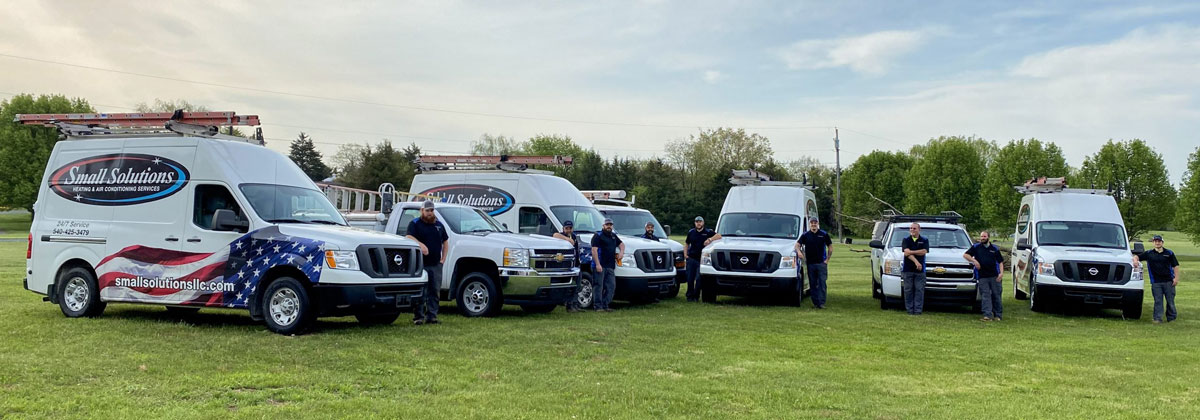
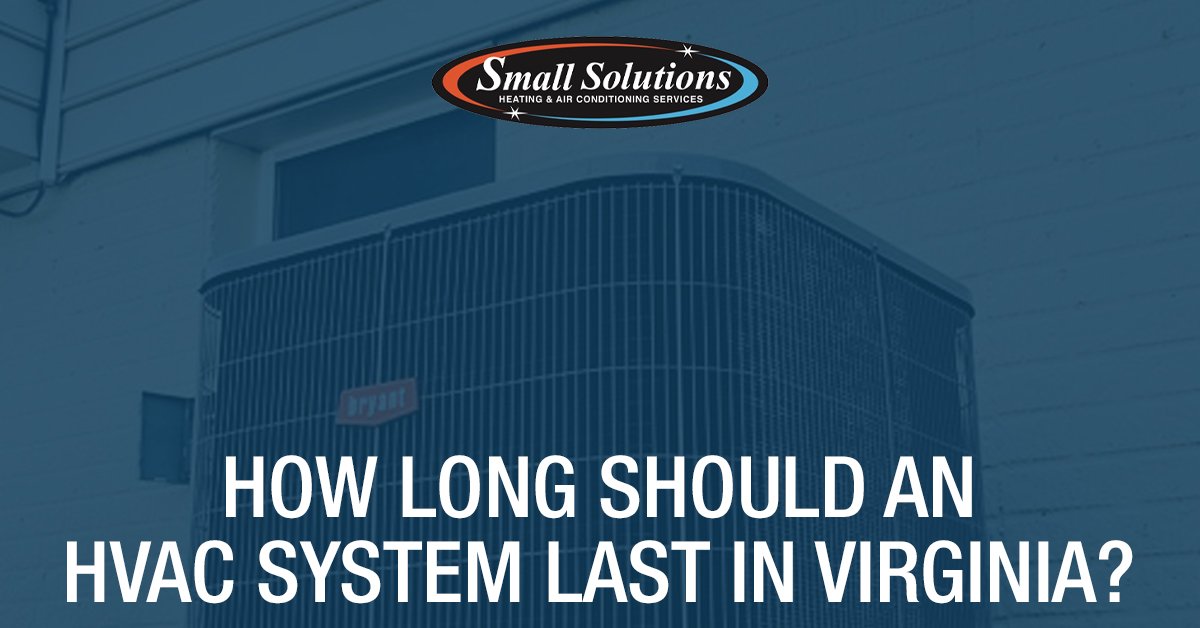
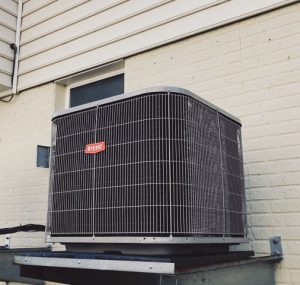
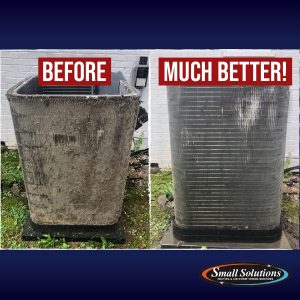
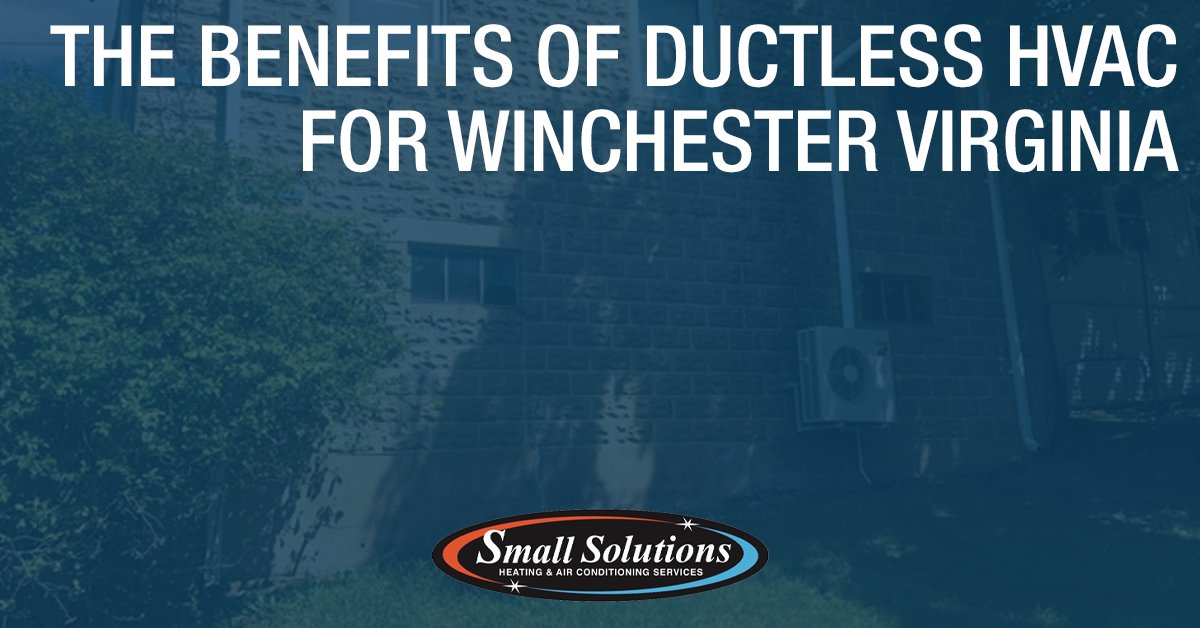
 Each mini-split unit takes in air and uses a refrigerant to “suck out” heat before blowing the air back into the room. The refrigerant travels through a compact line connected to an outdoor condenser unit. The outside unit “dumps” the heat out of the refrigerant before recirculating it indoors.
Each mini-split unit takes in air and uses a refrigerant to “suck out” heat before blowing the air back into the room. The refrigerant travels through a compact line connected to an outdoor condenser unit. The outside unit “dumps” the heat out of the refrigerant before recirculating it indoors.
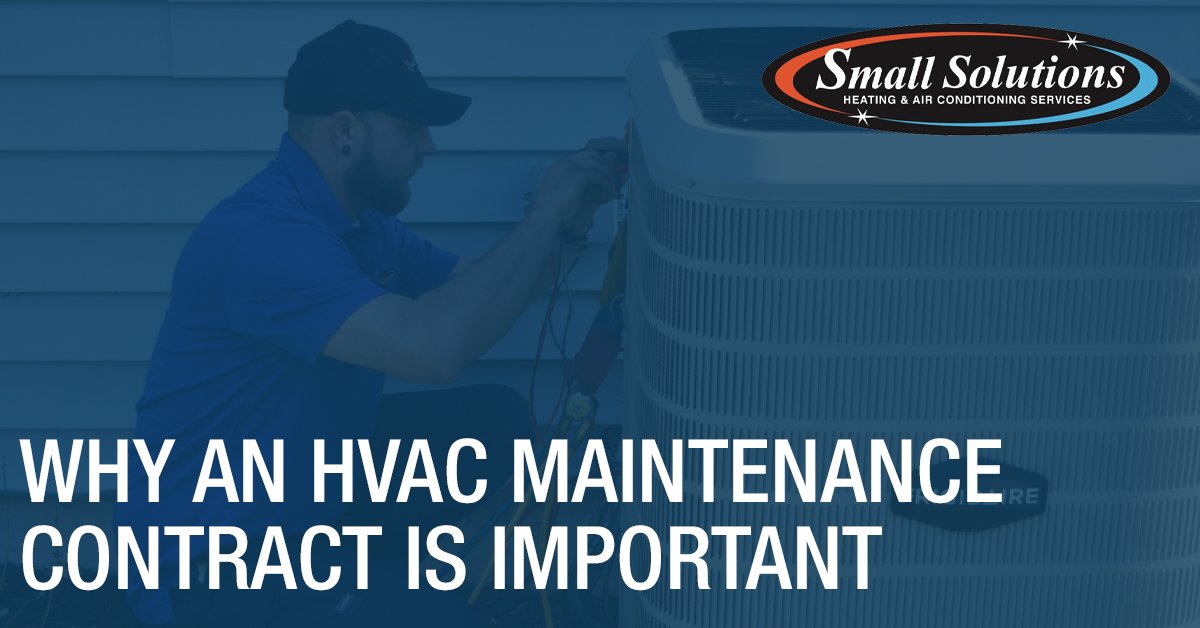
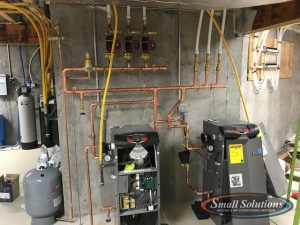 Routine inspection of your HVAC unit included in the contract will allow the technician to spot minor problems before they turn into major, expensive repairs. This gives you some time to prepare and budget for any needed repairs and replacements.
Routine inspection of your HVAC unit included in the contract will allow the technician to spot minor problems before they turn into major, expensive repairs. This gives you some time to prepare and budget for any needed repairs and replacements.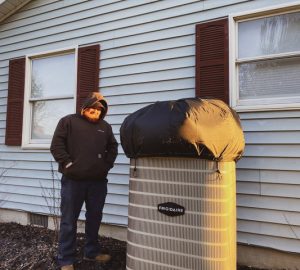
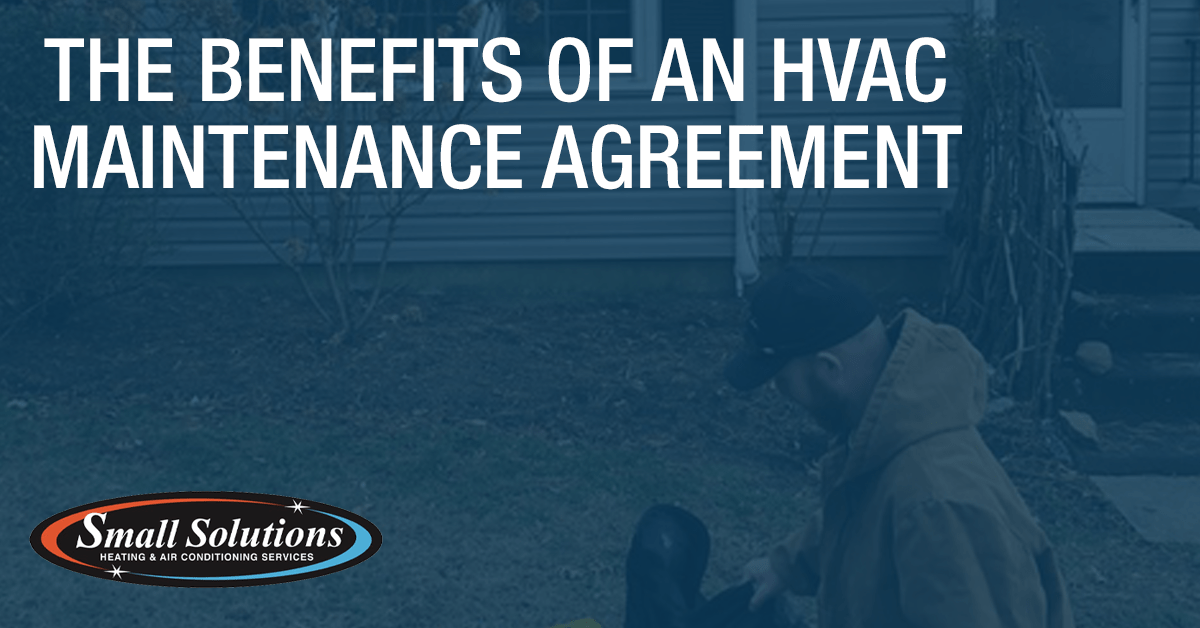
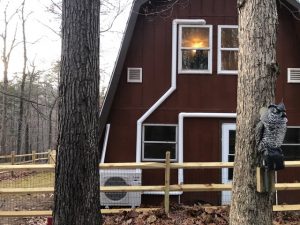 If you don’t track what you spend on heating and cooling your home, you may be in for a surprise. The average household in the United States
If you don’t track what you spend on heating and cooling your home, you may be in for a surprise. The average household in the United States 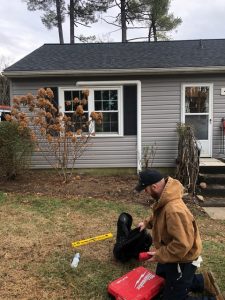 Having a plan for keeping your HVAC system running smoothly year-round typically involves two service visits. With an HVAC maintenance agreement, our technician will work with you to schedule times to come out for winter and summer tune-ups.
Having a plan for keeping your HVAC system running smoothly year-round typically involves two service visits. With an HVAC maintenance agreement, our technician will work with you to schedule times to come out for winter and summer tune-ups.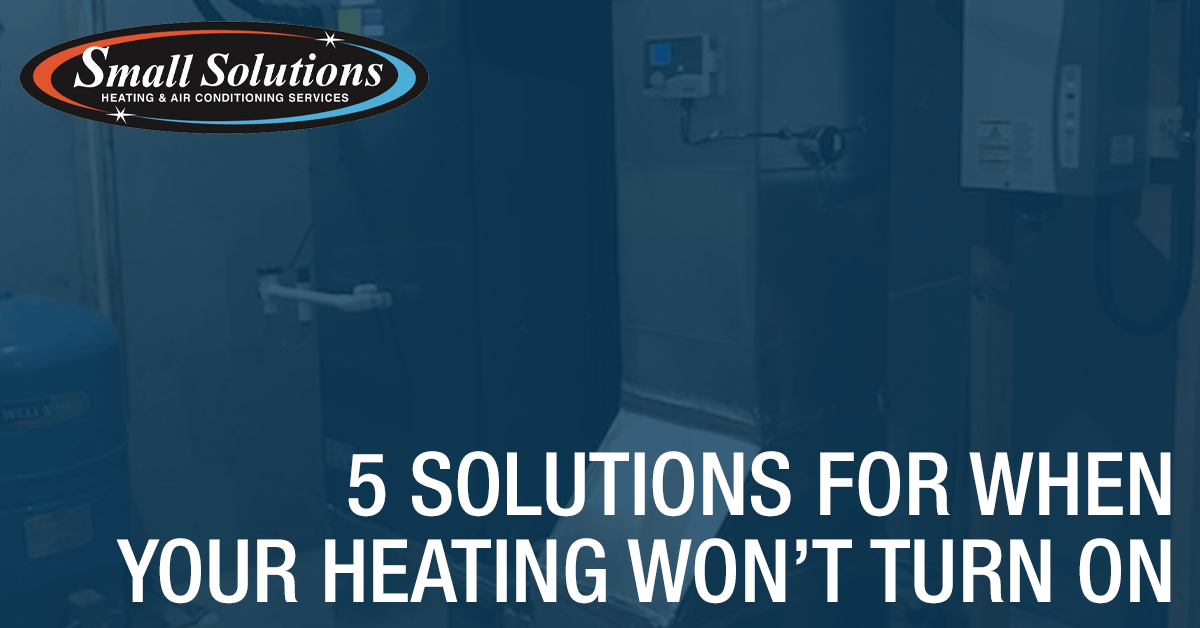
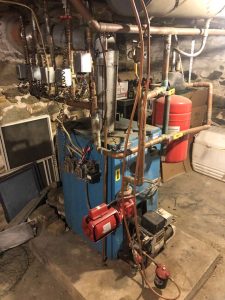 The following five items are easy to solve without calling a technician. A couple might require a service call only if you determine the part is not working or there’s a different problem.
The following five items are easy to solve without calling a technician. A couple might require a service call only if you determine the part is not working or there’s a different problem. The items to follow all call for the
The items to follow all call for the 